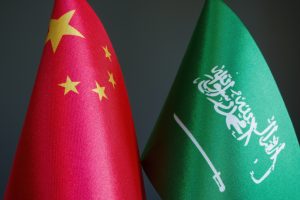China’s President Xi Jinping is going to Saudi Arabia – for real this time.
Back in August 2022, a spate of media reports claimed that Xi was set to travel to Saudi Arabia. At the time, it would have been his first trip abroad at all in well over two and a half years, and the reports took many by surprise for that reason. Choosing Saudi Arabia as Xi’s first destination in the post-COVID era would have been a huge diplomatic signal.
That didn’t pan out – instead Xi visited Kazakhstan and Uzbekistan in September 2022, followed by attending major international summits in Indonesia and Thailand in November. But now, four months after the initial rumors, Xi is finally headed to Saudi Arabia. He’ll be in Riyadh from December 7 to 10, China’s Foreign Ministry confirmed on Wednesday. In addition to his state visit and bilateral meetings, Xi will also attend two multilateral summits: a China-Gulf Cooperation Council summit and the first-ever China-Arab States summit.
While Saudi Arabia may not have been Xi’s first destination abroad since the pandemic hit, the timing of the trip is still significant. This is the Chinese leader’s first foray outside China’s immediate neighborhood since 2019. As such, it’s a signal of the increased importance Beijing is placing on the Middle East.
Beijing is not being shy about hyping the significance of the trip, which is Xi’s first to Saudi Arabia since January 2016 and his last trip to the Middle East since a July 2018 visit to the United Arab Emirates. The China-Arab States summit, in particular was trumpeted by Chinese Foreign Ministry spokesperson Mao Ning as “an epoch-making milestone in the history of China-Arab relations.” She described the summit as “the largest and highest-level diplomatic event between China and the Arab world since the founding of the People’s Republic of China,” but did not specify which leaders would be attending.
China has held regular ministerial meetings with the members of the Arab League under the China-Arab Cooperation Forum, with the last such meeting taking place in Beijing in 2018. This would be the first leader-level summit.
Amid shifting global winds and growing great power competition, China is keen to ensure the Arab states are on its side – or at least neutral. At the summit, “We hope to build more strategic common understandings on major regional and international issues to send a strong message about our determination to strengthen solidarity and coordination, render each other firm support, promote common development and defend multilateralism,” Mao said. In particular, China wants to see the Arab states advance cooperation with its new Global Development Initiative and Global Security Initiative, as well as the Belt and Road.
As of this writing, it has not been confirmed which countries will attend the China-Arab States summit. Presumably it will include most if not all of the 22 members of the Arab League (23 if we count Syria, whose membership was suspended amid the country’s civil war), which collectively cover the geographic span of the Arabian Peninsula and northern Africa. Xi will also hold a separate summit with the leaders of the GCC member states: Bahrain, Kuwait, Oman, Qatar, Saudi Arabia, and the UAE.
Xi’s first trip to Saudi Arabia in six years comes as U.S. ties with Riyadh have soured considerably, especially in the wake of the gruesome murder of Saudi journalist Jamal Khashoggi at the Saudi consulate in Istanbul, allegedly on Crown Prince Mohammed bin Salman’s direct orders. As a result, U.S. lawmakers have repeatedly urged the cessation of U.S. arms sales to Riyadh.
Meanwhile, in another sign of a growing rift, Saudi Arabia brushed off U.S. requests to increase its oil output to reduce global energy prices amid the energy squeeze caused by Russia’s invasion of Ukraine. After OPEC+ actually decided to cut production, the White House accused the oil production group of “aligning with Russia.”
As tensions with the United States mount, Saudi Arabia sees China as an important alternative. “The keenness of the Kingdom of Saudi Arabia… to develop bilateral relations with the Chinese side is part of its strategic plans to boost its bilateral relations and partnerships with all influential countries and international powers and to establish balanced relations with them,” the official Saudi Press Agency declared in an article overviewing China-Saudi relations ahead of Xi’s trip.
“The Kingdom of Saudi Arabia also seeks to build a strategic partnership that supports trade and investment with the Chinese side, and makes the Kingdom of Saudi Arabia China’s first reliable strategic partner in the region,” the agency added.
The Saudi Press Agency (SPA) said agreements worth over $29 billion would be signed during the summit. For context, the SPA put the total amount of Chinese investment in the country from 2005 to 2020 at $39.9 billion.
China has been Saudi Arabia’s top trading partner since 2017. That’s mostly because China is the top importer of Saudi oil, which accounts for over 78 percent of Saudi exports to China. But both sides are also keen to expand their economic cooperation beyond oil – for example, into partnerships on infrastructure construction, renewable energy, and new technologies like artificial intelligence and fintech.
China’s efforts to boost ties with Riyadh, however, will inevitably have to be balanced with Beijing’s relationship with Iran, Saudi Arabia’s acrimonious rival. China and Iran signed a major strategic cooperation agreement spanning 25 years back in March 2021.

































